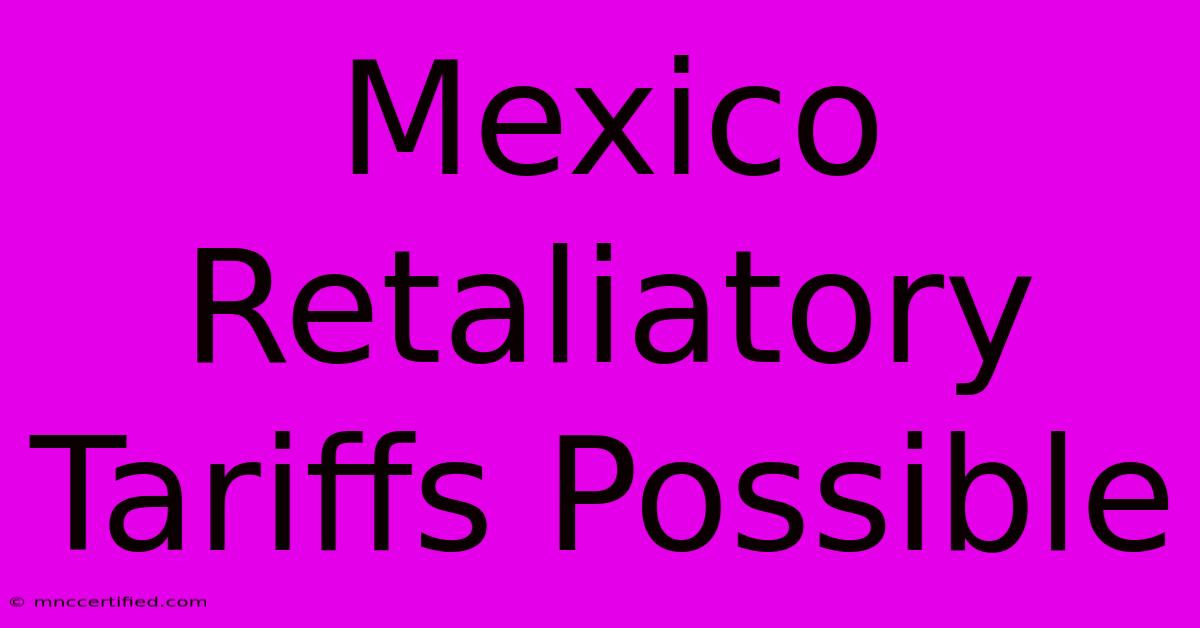Mexico Retaliatory Tariffs Possible

Table of Contents
Mexico Retaliatory Tariffs: A Looming Threat to Trade
The possibility of Mexico imposing retaliatory tariffs has become a significant concern for businesses and policymakers alike. Understanding the potential triggers, implications, and potential responses is crucial for navigating this complex trade landscape. This article delves into the factors that could lead to Mexico enacting retaliatory tariffs, exploring the potential consequences for both Mexico and its trading partners, particularly the United States.
Understanding the Triggers for Retaliatory Tariffs
Mexico's history demonstrates a willingness to utilize retaliatory tariffs as a tool to protect its domestic industries and respond to perceived unfair trade practices. Several factors could trigger such actions:
1. Trade Disputes: The most common trigger is a trade dispute, often stemming from disagreements over anti-dumping or countervailing duties imposed by another country. If Mexico believes these duties are unjustified or discriminate against its exports, it may retaliate with tariffs on goods imported from the offending nation. The ongoing USMCA (formerly NAFTA) agreement, while aiming for free trade, contains mechanisms for dispute resolution, but disagreements can still escalate.
2. Protectionism: Rising protectionist sentiments in a trading partner could prompt Mexico to implement retaliatory tariffs as a defensive measure. If a country significantly restricts imports from Mexico, it may be seen as justifiable to impose reciprocal restrictions.
3. Violation of Trade Agreements: A major violation of a bilateral or multilateral trade agreement by a trading partner could be a catalyst for retaliatory tariffs. This could involve breaches of rules concerning intellectual property, subsidies, or other trade-related issues.
4. National Security Concerns: In extreme cases, national security concerns could lead Mexico to impose tariffs on goods deemed to pose a threat to its national interests. While less frequent, this scenario remains a possibility.
Potential Implications of Mexican Retaliatory Tariffs
The consequences of Mexico imposing retaliatory tariffs are far-reaching and affect various stakeholders:
1. Impact on Businesses: Businesses exporting to Mexico would face higher tariffs, making their products less competitive and potentially reducing their export volumes. This could lead to job losses and reduced profits. Conversely, Mexican businesses could face higher costs for imported inputs, impacting their production and pricing strategies.
2. Consumer Prices: Consumers in both Mexico and the affected trading partner would likely experience higher prices for certain goods due to increased tariffs. This impact is particularly significant for price-sensitive goods.
3. Trade Relations: Retaliatory tariffs can severely damage trade relations between countries, leading to further trade disputes and escalating tensions. This can negatively impact broader economic cooperation.
4. Global Economic Uncertainty: The imposition of retaliatory tariffs introduces uncertainty into global markets, impacting investor confidence and potentially slowing down economic growth.
Mitigating the Risk of Retaliatory Tariffs
Preventing the imposition of Mexican retaliatory tariffs requires proactive measures:
- Strengthening Trade Diplomacy: Open communication and dialogue between countries are essential to resolve trade disputes before they escalate.
- Adherence to Trade Rules: Strict adherence to international trade rules and agreements helps prevent misunderstandings and disputes.
- Effective Dispute Resolution Mechanisms: Utilizing established dispute resolution mechanisms within trade agreements can help mediate conflicts and prevent escalation.
- Promoting Fair Trade Practices: Avoiding unfair trade practices, such as dumping or excessive subsidies, minimizes the risk of provoking retaliatory measures.
Conclusion: Navigating a Complex Trade Landscape
The threat of Mexico imposing retaliatory tariffs underscores the complexity of international trade relations. Understanding the potential triggers, implications, and mitigation strategies is paramount for businesses, policymakers, and anyone involved in cross-border trade. Proactive engagement, adherence to trade rules, and effective dispute resolution are crucial to maintaining stable and mutually beneficial trading relationships with Mexico and other global partners. Continuous monitoring of trade policy developments and engagement with relevant industry associations are essential for staying informed about potential risks and adapting accordingly.

Thank you for visiting our website wich cover about Mexico Retaliatory Tariffs Possible. We hope the information provided has been useful to you. Feel free to contact us if you have any questions or need further assistance. See you next time and dont miss to bookmark.
Featured Posts
-
Why Barcelona Closed Stadium Section Indefinitely
Nov 27, 2024
-
Aberdeen Fc Drops Fan Zone Alcohol Plan
Nov 27, 2024
-
Renters Insurance Riverside Ca
Nov 27, 2024
-
This Morning Bonnie Blue Sparks Viewer Debate
Nov 27, 2024
-
Barnes And Bollinger Insurance
Nov 27, 2024